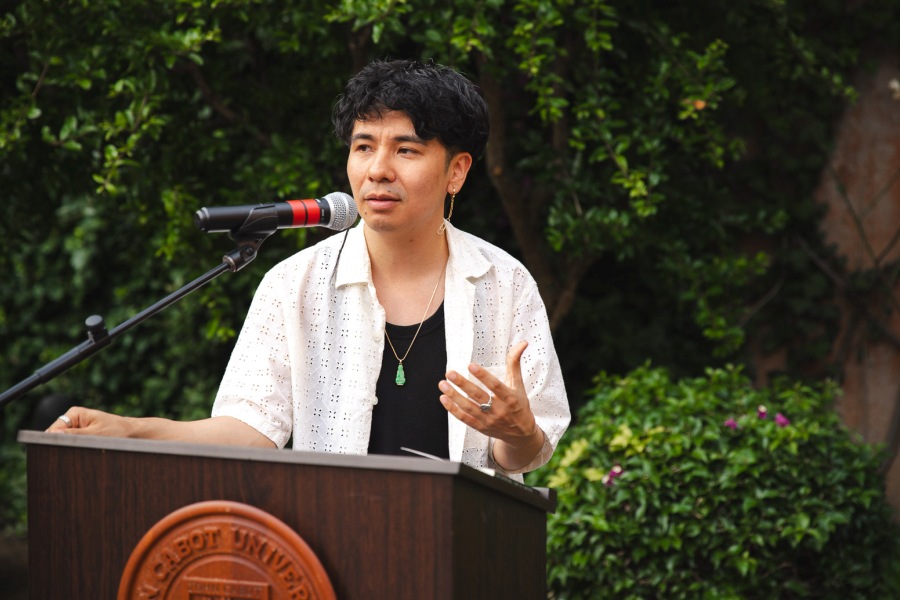"Do We Need God in the 21st Century?" A Talk with Professor Stuart Kauffman
On October 30, 2021, the JCU Institute of Future and Innovation Studies welcomed Professor Stuart Kauffman, a renowned theoretical biologist, doctor, and author. Professor Kauffman’s talk “Do We Need God in the 21st Century?” was the seventh event in the Cortona Pearls series, a joint seminar program organized with Cortona Friends to provide a discussion floor for the brightest minds in humanities and sciences.

Stuart Kauffman
Professor Kauffman focused his talk on how the doctrine of human domination has prevailed and shaped the Western approach to religion and science. Looking at major scientific breakthroughs of past centuries, one can point towards the discoveries of Copernicus, Kepler, and Galileo. They gradually denounced the doctrine of human domination by decentralizing human existence in the universal context. However, the findings of Newton and Laplace situated the aim of sciences in furthering human domination. Through studying the laws of nature, humanity could theoretically learn to control nature.
This notion of dominance and control deeply influenced Western science, even though it was met with opposition (for example during the Romantic period). The anthropocentric view of human control over the world was significantly challenged in the past century. The emergence of post-structuralism and the teachings of Jacques Derrida put into question the notion of fundamental meaning, arguing that no meaning is stable and any text can produce an indefinite chain of possible meanings. With postmodernism, the understanding of science has shifted towards perceiving it as a social construct. With general relativism, the notion of truth is being debated. “It seems that the more we know of the universe, the more meaningless it is,” Professor Kauffman added.
As Professor Kauffman noted, these changes did not influence the worldview of human domination that was strengthened following Newton’s discoveries. In the Newtonian paradigm to rationalize and control, humanity embraced the vision of the world as calculatable and predictable. Professor Kauffman added: “We lost our humanity and became like deterministic machines, but Newton was wrong.” Professor Kauffman explained that the Western worldview has been caught in a binary of causalities, which has been reinforced with Newton’s discoveries. However, in the past decade, science has proved that causalities are not necessarily a valid framework anymore.
Professor Kauffman pointed out that the Newtonian paradigm is not accurate, as it fails to predict evolution in biospheres. He argued that “the universe and biosphere are increasing in diversity and expanding, the world is becoming ever more complex and broader, evolution is not deductive process.” In his research on the origin of life and evolution, he also concluded that there is no mathematical possibility of using set theory to deduce possible evolutionary outcomes of given biological features.
In summing up his recent research, Professor Kauffman theorized that any biological feature has indefinitely many possible future uses. It is impossible to count all possibilities and reject the ones that are impossible. Consequently, there is no law for evolving biospheres. Rather than following the cause-effect trajectory, evolutionary processes are “making-possible.” As Professor Kauffman put it, “the evolving process is not about making future but allowing for certain future: it makes possible, not causes.” He summarized his point by stating that “there is no compact formula to reduce everything and to have it printed on a shirt as the final theory of everything.”
As laws are ultimate powers in the Newtonian paradigm, the notion of transcendent God situates God outside and above the universe. Instead, Professor Kauffman argued that people should embrace the notion of immanent God – a God who is not above, but a part of the process of ongoing creativity. “If God still creates,” Professor Kauffman continued, “God is an ongoing creation in the creating of the universe.” Humanity is not only a part of this process of creative becoming, but an active participant. “Just as God is an ongoing creation, so are we. We are of it and not above it,” he said. In this understanding, the notion of immanent God bears similarities to Buddhist teachings, Professor Kauffman noted. People are argued to be of nature, not above nature, and everything is a condition for everything else.
The doctrine of human domination over the environment was furthered by Western religion and science. Through past centuries, it disseminated the idea of human beings as above nature to general consciousness. In reality, humanity is not able to control or predict nature. Despite this premise being an error, the current economy is fueled by capitalism and seems to reinforce the idea that human destiny is the position of power and domination. “This statement is intrinsically incorrect,” Professor Kauffman argued. Above all, he advocated that “we need to reinvent our spirituality now because, with the degradation of natural resources, humanity has only one decade to do it.” He believes that a significant change in spiritual understanding of the human place within the environment must occur now. Otherwise, the further invasion of natural habitats, pandemics, and climate change will become unstoppable.





